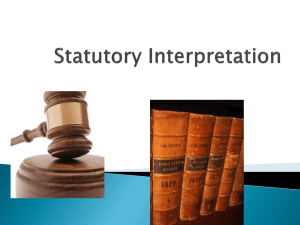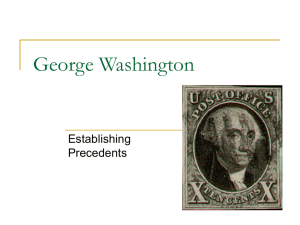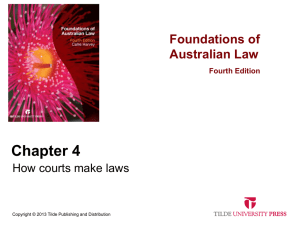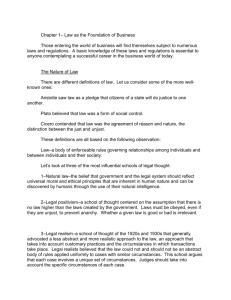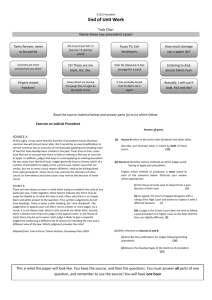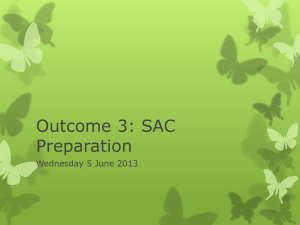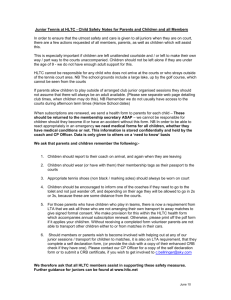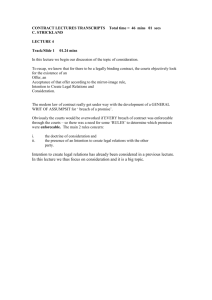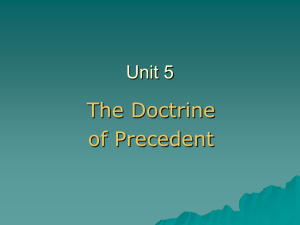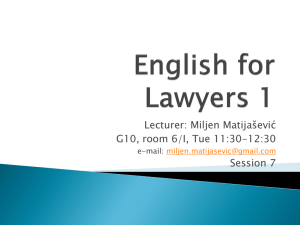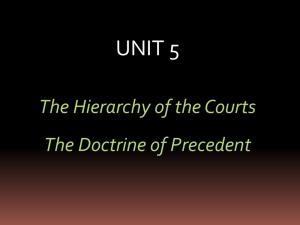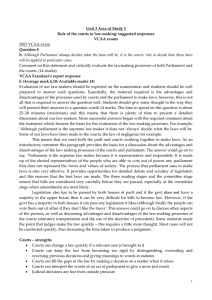EDUC 747 Advanced School Law *Note: All content provided in the
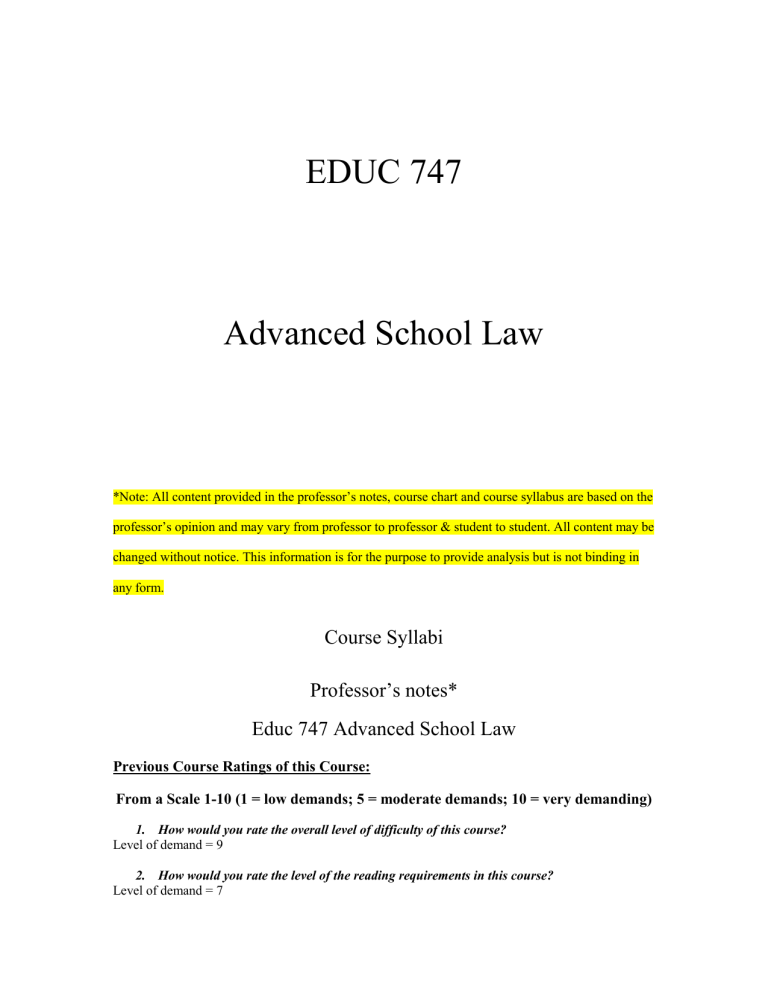
EDUC 747
Advanced School Law
*Note: All content provided in the professor’s notes, course chart and course syllabus are based on the professor’s opinion and may vary from professor to professor & student to student. All content may be changed without notice. This information is for the purpose to provide analysis but is not binding in any form.
Course Syllabi
Professor’s notes*
Educ 747 Advanced School Law
Previous Course Ratings of this Course:
From a Scale 1-10 (1 = low demands; 5 = moderate demands; 10 = very demanding)
1.
How would you rate the overall level of difficulty of this course?
Level of demand = 9
2.
How would you rate the level of the reading requirements in this course?
Level of demand = 7
3.
How would you rate the level of the lecture requirements in this course?
Level of demand = 7
4.
How would you rate the level of the online exam requirements in this course?
Level of demand = 9
5.
How would you rate the level of the pre-campus reading requirements in this course?
Level of demand = 7
6.
How would you rate the level of the written paper/presentation requirements in this course?
Level of demand = 10
Comments: This course requires original legal research in an institutional (K-12 or higher ed.) setting.
Additional comments:
Comments: This course should be taken AFTER completion of two research/statistics courses but that is not required.
C
OURSE
S
YLLABUS
S
CHOOL OF
E
DUCATION
C
OURSE
N
UMBER
EDUC 747
C
OURSE
T
ITLE
A
DVANCED
S
CHOOL
L
AW
These are subject to change. Please refer to your course syllabi located in your
Blackboard Module for details on assignments. This is only for planning purposes and to make you aware of the Pre Course Assignments that are required for all intensives.
C OURSE D ESCRIPTION
And in-depth study into Educational-Institutional Law and how social and cultural changes are directing how our courts act and react. A new global mind-set present in our high courts has and will continue to re-direct how our courts view many judicial rulings and from those considerations a new set of legal precedents will emerge impacting how our educational systems are viewed by those courts. This global mind-set has increased exponentially during this new president’s cabinet.
R ATIONALE
To study the laws governing education and religious conflicts of our Western world helps us understand the demands, restrictions, and provisions for what is called
“separation of church and state”. It would benefit us greatly to devote much time to this study because much of today’s growing societal unrest with education can, and logically so, be connected to the religious unrest throughout our nation and our world.
Blackstone (A Historically Christian Authority on Law) says, “The doctrine of the law then is this: that precedents and rules be followed, unless flatly absurd or unjust; for though their reason be not obvious at first view, yet we owe such a deference to former times as to suppose that they acted wholly without consideration.” This is presently under attack by what is called “social justice”. Doctrinally speaking, our court of last resort is a court that is not inexorably bound by its own precedents but will follow the rule of law which it has established in earlier cases. This has clearly been followed in setting case precedent. However, when our “law givers and makers” are convinced that a past decision was originally flawed or is not longer worthy of consideration because of changing conditions or that more good than harm will come by departing from that precedent, our courts have and will change their position.
Here we see that a few well chosen law cases can and often will set the tone for any considerations given to a new law debate. The granting of precedent will give some continuity to most decisions made by our high courts of appeal. As late as 1985, Justice
Rehnquist wrote in his dissent to Wallace v. Jeffree, saying it is a, “metaphor based on
bad history, a metaphor which has proved useless as a guide to judging…..should frankly and explicitly be abandoned.”
It is imperative that our school and institutional leaders have a firm grasp on past case precedent and how those decisions could be redirected because of social and cultural changes the courts have determine should be considered. Additionally, our courts are using more European case precedents in determining how American Laws should be applied and/or adjusted. The “global mind-set” has and will continue to impact our judicial system and how new cases will be reviewed and how decisions will be made.
I.
P REREQUISITES
Acceptance into the Educational Specialist or Doctor of Education program of the
Graduate School of Education.
II.
R EQUIRED T EXTBOOK ( S )
Alexander, Kern and M. David Alexander, American Public School Law, Thomson
West Publishers, 2005 ISBN 0 534 27424 2
(e-version is very acceptable and may be cheaper)
Stader, David L., Law and Ethics in Educational Leadership, Merrill/Prentice Hall,
2007 ISBN 0 13 111981 8
Schaeffer, Francis A., How Should We Then Live , Crossway Books
ISBN 0 89107 292 6, 17th Edition 1996 Wheaton, Illinois
Subscribe to Liberty Alert . It is a free opt-in, email to keep you informed about issues affecting our religious freedom, the sanctity of human life and the traditional family. To subscribe to Liberty Counsel’s Liberty Alert, go to www.lc.org, under FREE SUBSCRIPTIONS (top right corner) click on “Liberty
Alert email update,” enter your email address and your name where indicated and click subscribe.
A Computer Based Bible with various versions included for ease in researching
Biblical topics related to laws of the Old Testament and moralities of the New
Testament can be a good reference source. (not required)
ACSI Legal Principles-Explore this site for awareness of the material there.
III.
M
ATERIALS FOR
L
EARNING
A.
Internet access (broadband or cable required) Microsoft Word and Power
Point or some format for visual presenting your project.
IV.
C
OURSE
O
BJECTIVES
1. From a philosophical and theoretical framework, each student evaluates legal issues involved in public and private education or public and private higher education. The focus is the legal and ethical behaviors of a Christian leader.
2. Each assigned group will research, analyze, and present an educational legal issue that has gained state and/or national media attention. Each group will follow the guidelines given in the development of a PowerPoint presentation to be given the last day of class. (see examples given)
3. In a public or private educational setting, each student will apply legal philosophy and social policy in formulating decisions or underlying legislation.
4. When addressing school issues, each student evaluates Constitutional
Amendments, specific state statutes and regulations and will determine how to comply with these requirements under educational circumstances.
5. When reviewing an educational situation, each student analyzes the elements making up a negligence action and determines how to identify potential problem areas to avoid liability.
6. After analyzing the numerous elements of a factual scenario, each student will develop strategies for dealing with specific legal problems from a moral and ethical position.
7. Using the organizational structures of his/her current educational assignment or those of an institution for which he/she has secured permission to study, each assigned student group (3 students) from similar educational setting will research a current state or national level educational issue that has cause some level of media exposure and a level of legal liability for the institution..
V.
C
OURSE
R
EQUIREMENTS AND
A
SSIGNMENTS
A.
Textbook readings and cases are specified in each Module
B.
Pre-Campus Discussion Board concerning Schaeffer
Share web links for Schaeffer’s book in video format.
C.
Essay 1-Follow the Book Critique format for this Essay. Minimum of ten (10) pages, double spaced is required. This will be the first area for discussion Monday morning. To be submitted by Sunday night prior to
Intensive Week.
D.
Essay 2-- To be completed in class, Monday afternoon, after you have returned from Orientation and Lunch. An APA-original work paper will be required. It must be a minimum of four (4) typed, 1 ½ spaced paper with a maximum of 10 pages. Follow ALL APA guidelines and you are cautioned on citing your sources. Plagiarism is a growing concern and due to the nature of this course will be consider as an academic violation warranting some level of administrative review.
E.
Final Exam
There are three sections to the Final Exam. Each section will be assigned after that material has been covered. The Question Booklet from
Alexander/Alexander will be given on Monday morning of the Intensive
week. On the Course Chart-2010, you will see when Exam Part 1, 2, and
3 are assigned and dates for each submission.
The Answer Form is on Blackboard under Final Exam. There are no time limits set on your opening and closing the exam, only the day the completed section must be submitted.
F.
Six Discussion and Case Modules
There are six (6) Modules plus one Introductory Module. Contained in each Module are guidelines and directions for completing that Module.
Each Module contains articles, power points, tests assignment and points of discussion that you will consider during your review of the specific law cases, events, or legal areas being studied.
G.
Final Project
You are to research a national or state law case at the educational level of your group’s institutional interest. Research the case thoroughly and present all sides and issues involved. Presentation: The required format of this assignment is
PowerPoint. It allows for easy flow and presentation of materials developed.
Professional dress is required for this presentation.
You will research an institutional legal issue that has faced an educational district or an administrator (at the building level) within a school district.
Because of the diverse enrollment in this course, the institutional level will be according to your educational involvement. It must be current (within the last 3 to 5 years) which has brought the school and/or district into legal conflict. It had to make national news with its implications. The case must deal with a legal entanglement in a public and private school or district, or department or division of a college or university.
If you are a church administrator and thus not associated with an educational institution, your case must deal with a church entanglement which led to a law suit or the threat of a law suit (ex. A church in the
Dallas area that would not allow a gay family funeral in their sanctuary or the New Jersey case dealing with rental of church property for Gay group gatherings). This will be a cohort group project and will be organized around grade levels and institutional levels specific for your group. (K-12 levels, community college levels, university levels, church/Christian school levels, etc.)
The purpose of the presentation is to look at the events that occurred at an educational institution or church related institution (ex. Jena High School in Jena, Louisiana; Supreme Court Case-Bong for Jesus, Juneau, Alaska) and determine if the leaders involved in this story acted appropriately.
You are to evaluate what took place and look at what should have and could have been done differently in the case? Did the school leadership act appropriately to the issue? What ethical problems could be seen in the leadership’s behavior or action? With all this information available, what could have been done to reduce the impact of the case on the institution?
VI.
E
VALUATION AND
G
RADING
Grading Weights
C
D
Schaeffer Critique-Essay 1
APA Original Essay 2
E
F
American School Law Final Exam, 1, 2, and 3
Legal Project (Follow Specifics Given)
A.
Scale
Points
300
200
600
400
A = 94–100 B = 86–93 C = 75–85 D = 68–74 F = 0–67
VII. B
IBLIOGRAPHY
Del Giorno, Michael, Standing Up for What is Right, 2004
Brown Books Publishing Group, Dallas, TX
Mawdsley, Ralph D., Legal Problems of Religious and Private Schools
Purposeful Design Publications ACSI
Valente, William D., Law in the Schools , 5th edition, 2000
Prentice Hall College Div.
Whitehead, John W., The Rights of Religious Persons in Public Schools , 1994
Crossway Books Publisher

